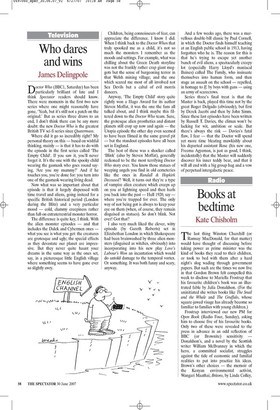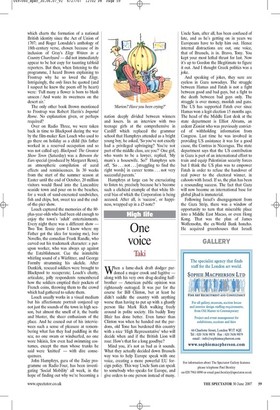Books at bedtime
Kate Chisholm phe last thing Winston Churchill (or Ramsay MacDonald, for that matter) would have thought of discussing before taking power as prime minister was the kind of books they read to their children, or took to bed with them after a hard night's slog wading through government papers. But such are the times we now live in that Gordon Brown felt compelled this week to disclose to Mariella Frostrup that his favourite children's book was an illustrated fable by Julia Donaldson. (For the uninitiated she writes books like The Snail and the Whale and The Giuffalo, whose square-jawed visage has already become so familiar to families with young children.) Frostrup interviewed our new PM for Open Book (Radio Four, Sunday), asking him to choose five of his favourite books. Only two of these were revealed to the press in advance in an odd reflection of BBC (or Brownite) sensitivity — Donaldson's, and a novel by the Scottish writer William McIlvanney in which the hero, a committed socialist, struggles against the tide of economic and familial realities to put into practice his ideas. Brown's other choices — the memoir of the Kenyan environmental activist, Wangari Maathai; Britons, by Linda Colley, which charts the formation of a national British identity since the Act of Union of 1707; and Roger Lonsdale's anthology of 18th-century verse, chosen because of its inclusion of Gray's Elegy Written in a Country Churchyard — did not immediately appear to be hot copy for taunting tabloid reporters. But then, when listening to the programme, I heard Brown explaining to Frostrup why he so loved the Elegy. Intriguingly, the only lines he quoted (and I suspect he knew the poem off by heart) were: 'Full many a flower is born to blush unseen / And waste its sweetness on the desert air.'
The only other book Brown mentioned to Frostrup was Robert Harris's Imperial Rome. No explanation given, or perhaps required?
Over on Radio Three, we were taken back in time to Blackpool during the war by the film-maker Ken Loach who used to go there on holiday as a child (his father worked in a reserved occupation and so was not called up). Blackpool: The Greatest Show Town (Saturday) was a Between the Ears special (produced by Margaret Renn), an atmospheric compilation of aural effects and reminiscences. In 30 weeks from the start of the summer season at Easter until the end of October, 20 million visitors would flood into the Lancashire seaside town and pour on to the beaches, for a week of sand-encrusted sandwiches, fish and chips, hot, sweet tea and the endof-the-pier show.
Loach captured the memories of the 80plus-year-olds who had been old enough to enjoy the town's 'adult' entertainments. Every night there was a different show — Two Ton Tessie (now I know where my Father got the idea for teasing me), Ivor Novello, the comedian Frank Randle, who carved out his trademark character: a putupon worker, who was always up against the Establishment. Cue the inimitable whirling sound of a Warlitzer, and George Formby strumming his ukelele. After Dunkirk, rescued soldiers were brought to Blackpool to recuperate; Loach's chatty, articulate, jolly respondents remembered how the soldiers emptied their pockets of French coins, throwing them to the crowd which had gathered to salute them.
Loach usually works in a visual medium but his affectionate portrait conjured up not just the sounds of the town in high season, but almost the smell of it, the bustle and bluster, the sheer enthusiasm of the place. And he coaxed out of his interviewees such a sense of pleasure at remembering what fun they had paddling in the sea; no one swam or windsurfed, no one wore bikinis, few even had swimming costumes, except the man whose trunks he said were 'knitted' — with dire consequences.
John Humphrys, guru of the Today programme on Radio Four, has been investigating 'Social Mobility' all week, in the hope of finding out why we're becoming a nation deeply divided between winners and losers. In an interview with two teenage girls at the comprehensive in Cardiff which replaced the grammar school that Humphrys attended as a bright young boy, he asked, 'So you've not exactly had a privileged upbringing? You're not part of the middle class, are you?' One girl, who wants to be a lawyer, replied, 'My mum's a housewife. So?' Humphrys sets off, 'So . . . not ... [struggling to find the right words] in career terms . . . not very successful parents.'
Humphrys at large can be excruciating to listen to, precisely because he's become such a clicheed example of that white liberal bias of which the Corporation is being accused. After all, is 'success', or happiness, wrapped up in a £5 note?



















































































 Previous page
Previous page